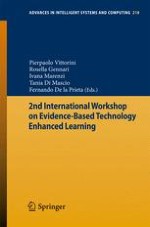Research on Technology Enhanced Learning (TEL) investigates how information and communication technologies can be designed in order to support pedagogical activities. The Evidence Based Design (EBD) of a system bases its decisions on empirical evidence and effectiveness. The evidence-based TEL workshop (ebTEL) brings together TEL and EBD.
The first edition of ebTEL collected contributions in the area of TEL from computer science, artificial intelligence, evidence-based medicine, educational psychology and pedagogy. Like the previous edition, this second edition, ebTEL’13, wants to be a forum in which TEL researchers and practitioners alike can discuss innovative evidence-based ideas, projects, and lessons related to TEL.
The workshop took place in Salamanca, Spain, on May 22nd-24th 2013.
